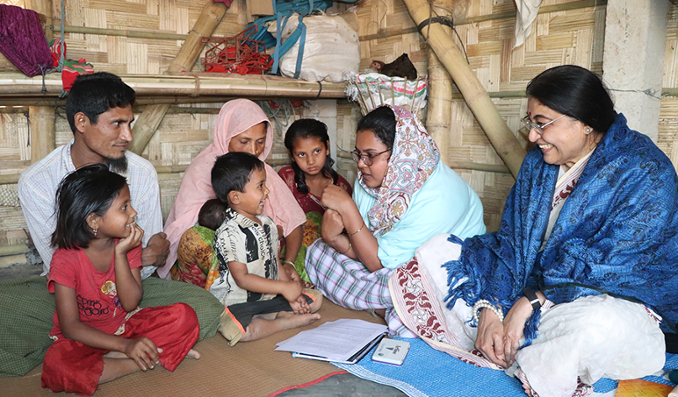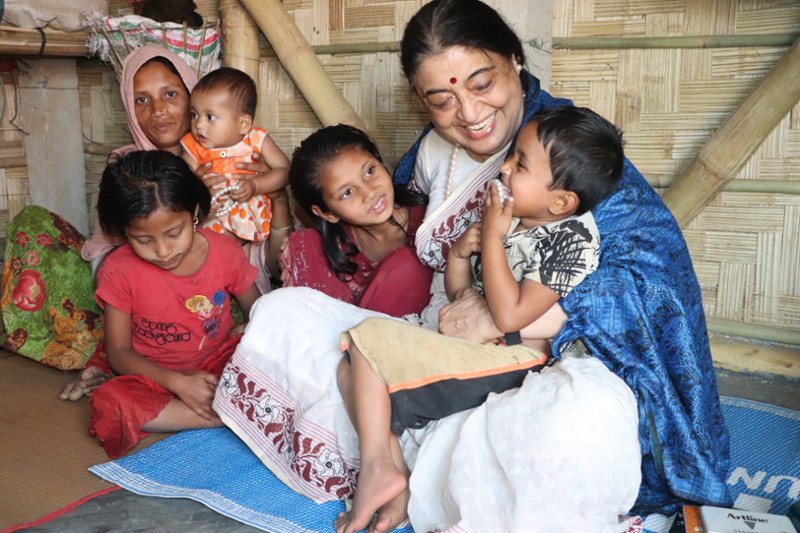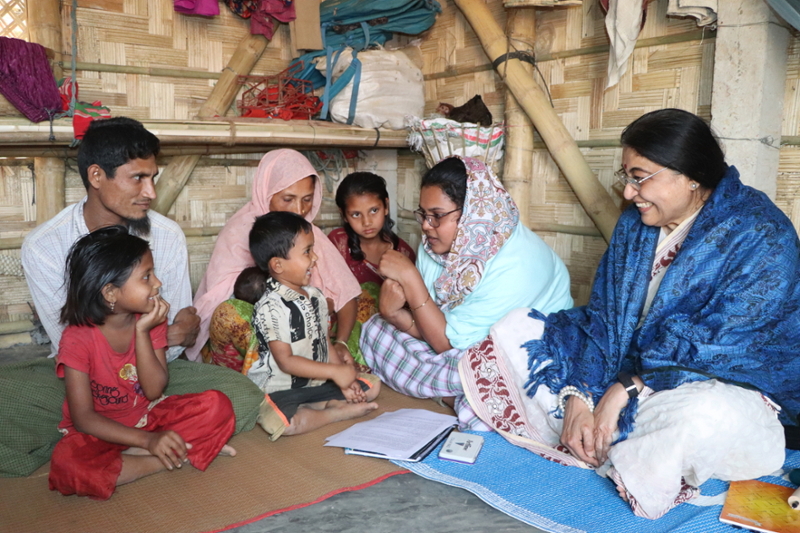Global Faculty Research Profile: Fauzia Ahmed
“Gender and Empowerment in the Rohingya Refugee Population in Bangladesh”

Dr. Fauzia Ahmed, Associate Professor of Sociology, was awarded funding from the Philip M. & Elaina Hampton Fund for Faculty International Initiatives during the 2020 fiscal year, to travel to Bangladesh from December 2019 to March 2020 and conduct Participatory Action Research (PAR) on gender and empowerment among Rohingya women in refugee camps.
As Ahmed explained, "In January 2020, the International Court of Justice, the highest court in the world, ruled that the military junta in Myanmar must stop all acts of genocide against the Muslim minority Rohingya. As a member of the international community, Myanmar can ill afford to ignore the ruling — even though it has officially rejected it. Undeniably, this is a moral victory for the Rohingya – and for all of us who believe in dignity and justice as a fundamental human right."
What led you to research this population?
The Rohingya are the largest refugee population in the world today. Disbarred from citizenship in Myanmar, the country of their birth, and faced with the scorched-earth policy of the military regime, approximately one million Rohingya have sought refuge in neighboring Bangladesh.
I decided to research this population for three reasons: First, stateless and silenced, Rohingya women are the most marginalized group in the world today. Second, although many agencies are working to help the Rohingya, but Rohingya women have not been included in discussions of their problems and solutions. Third, I believed that my own childhood refugee experience would give me special insights to their perspectives. In sum, I wanted to conduct this research to enable the voices of Rohingya women to be heard.
What does your project entail?
My project has three aims: first, to create a platform for Rohingya women’s narratives by exploring their perspectives on their problems and their solutions. But women’s problems and solutions are also located in the attitudes and practices of men. So I also investigated Rohingya masculinities and their impact on women’s agency. The final goal is to build the Rohingya Gender Empowerment Program, for Akota (Solidarity), a local Non-Governmental Organization (NGO), based on research findings.
Bangladesh, which is itself a poor country, has opened its doors to the Rohingya. The government effort is impressive. The camps are well organized into blocks, each with a Rohingya leader who is responsible for each block community. But most of all, I am inspired by the Rohingya men and women, and their unshakeable faith and resilience, despite the atrocities that they have experienced.

Having fun with the children
About Dr. Fauzia Ahmed

Associate Professor
Sociology and Gerontology
Women's, Gender, & Sexuality Studies Program
- PhD Social Policy - Brandeis University
- SM Health Policy and Management - Harvard University
- AB Biology - Harvard University
- Associate Professor of Sociology and Gerontology at Miami since 2015
Research Interests
- Gender and development, masculinity, Islam, labor and globalization, forced displacement and development, art and development
Current Projects
- Gender, microcredit, masculinity, and empowerment, gender and empowerment in the Rohingya refugee population, gender and labor in the garment industry
What were some of the outcomes of your research?
There were three outcomes: research findings, workshops, and a video.
Research Findings
- All block leaders (majhee) are men. Rohingya women argue that a female co-leader would enable women’s concerns to be better addressed.
- The Myanmar army has killed many Rohingya men; as a result, there are many young women without male relatives. These women are vulnerable to rape and sex trafficking.
- A range of masculinities exists; progressive Rohingya men need greater visibility so that they can ally with Rohingya women.
- The Rohingya are devout Muslims, and Islam is both a source of personal resilience and community cohesiveness.

Interviewing a family

A tea shop break
Workshops, Presentations and Video
We conducted three interactive workshops in Bangladesh to share and discuss our findings. I initiated each workshop with a presentation.
- “Rohingya Contexts: Problems and Solutions,” for the United Nations personnel and Non-Governmental Organizations (NGOs) staff, government officials and journalists. Solutions ranging from microcredit to women to safety measures for young girls were discussed.
- “Participatory Action Research: Sharing Findings with the Rohingya Refugee Community," for the Rohingya community. Solutions were identified as elimination of dowry, eradication of domestic violence, protection of girls and women and mentoring for youth.
- “Lessons in Faith and Hope for Adolescent Refugees,” for Rohingya girls and boys to ascertain adolescent perspectives. Rohingya adolescents want desperately to study: they want a school system which allows them to work during the day so that they can help their families and to study at night.

Left to right: Sharing research findings; UN staff, NGO workers, and journalists listen; Fauzia with her research team
I received a grant from the John E and Winifred E Dolibois Faculty Development Fund, Farmer Business School, Miami, to conduct these workshops.
Based on my research findings I made a video, “The Weight of Unshed Tears: A Journey through the Rohingya Refugee Camps,” on my return to Miami. Its purpose is to describe my ethnographic research methodology and to share my findings with the academic community NGOs and potential donors. This video was made possible through a grant from the Digital Humanities Fellowship at Miami.
How did the COVID-19 pandemic affect your research?
Planned public presentations about my research planned for late spring 2020 were postponed due to the COVID-19 crisis. I have been unable to go back to the Rohingya refugee camp in December 2020 as I had planned. We have postponed Akota’s Rohingya program. Despite this, our emphasis on communication via phone with the refugees ensures continuity of purpose.
What are your plans for the coming year?
As a result of my research, I am developing new course modules on gender, empowerment, and refugee status for GIC/WGS 201 (Introduction to Women’s Studies), SOC/GIC/ITS 305 (The Sociology of Globalization), and SOC/WGS 203 (The Sociology of Gender). I am also working with faculty in the College of Engineering and Computing to design an interdisciplinary capstone project and connect Miami’s chapter of Engineers Without Borders to the Rohingya community.
PAR means linking research to social change. As founder of Akota, I will utilize research findings to develop programs for Rohingya women, men, and adolescents. My future plans are:
- to conduct research on adolescent Rohingya masculinities and femininities, and to use findings to establish the Akota program for youth empowerment, with a focus on girls; and
- to research Rohingya women’s employment, and through Akota, create employment, such as a sanitary napkin factory which would be managed and staffed by Rohingya women.

